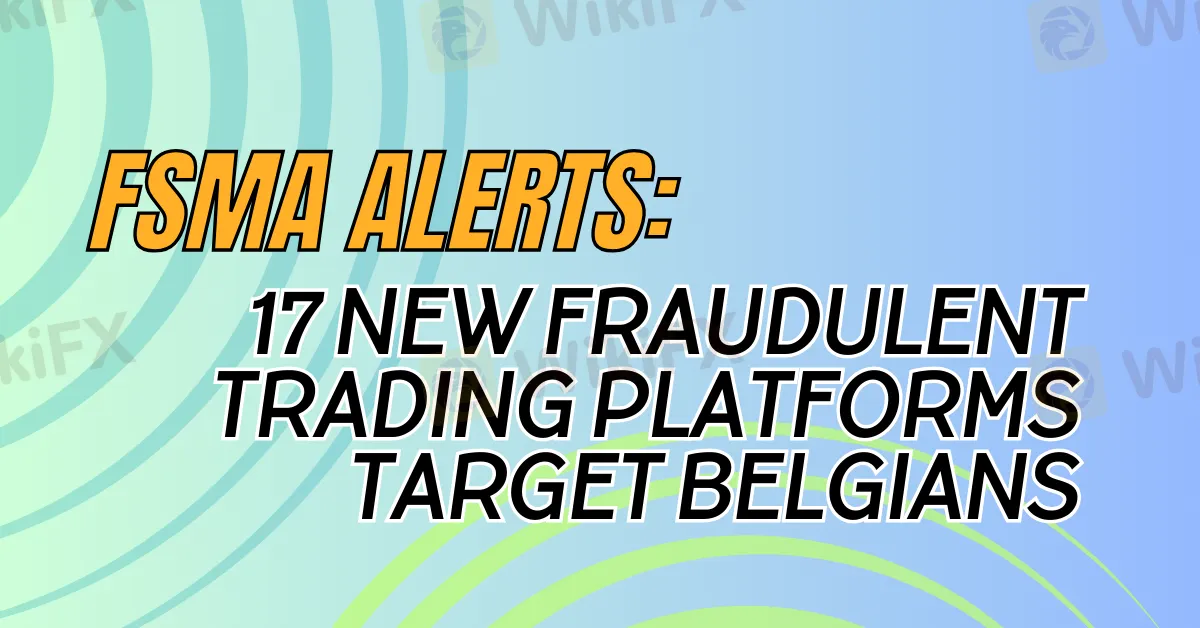简体中文
繁體中文
English
Pусский
日本語
ภาษาไทย
Tiếng Việt
Bahasa Indonesia
Español
हिन्दी
Filippiiniläinen
Français
Deutsch
Português
Türkçe
한국어
العربية
FSMA Alerts: 17 New Fraudulent Trading Platforms Target Belgians
Abstract:The FSMA issues a warning about 17 new deceptive trading platforms, combining cryptocurrency and FX/CFD providers, targeting Belgian citizens through enticing promises, emphasizing the importance of vigilance against financial fraud.

The Financial Services and Markets Authority (FSMA) has issued an updated advisory concerning deceitful online trading platforms specifically targeting Belgian citizens. The regulatory body has expanded its list to include 17 additional platforms, encompassing both cryptocurrency and FX/CFD trading providers.
The FSMA highlights that these trading platforms employ social media and online advertisements to attract potential victims, enticing them with promises of effortless profits through cryptocurrency trading, trading bots, or educational programs. Subsequently, victims, having provided personal information, face pressure from purported “experts” and “traders” to invest more funds, only to witness their investments disappear.

Among the recently identified entities in the warning are Bit 2.0 Urex, Bitcoin 360 AI, BitiCodes, BitIQ, and Immediate Connect. The comprehensive list is accessible on the FSMA website. The regulator has traced numerous victims back to instances where they submitted contact information on these platforms' websites.

While everything may seem in order initially, attempting subsequent withdrawals reveals unexpected obstacles. Victims are confronted with unforeseen 'taxes,' accompanied by additional fees, cautions the FSMA regarding common fraudulent practices.
The FSMA provides guidance on recognizing investment fraud, incorporating videos and flowcharts illustrating typical scam progressions. Individuals who suspect falling prey to these platforms can lodge a complaint directly with the FSMA or the police.
Several months ago, the FSMA alerted the public to a growing trend where fraudsters emulate prominent banks, a concern flagged since 2021. According to the authority, this deceptive tactic is on the rise.
Fraudsters utilize diverse strategies, reaching out to potential victims via phone or email, particularly those who have disclosed contact information through social media or promotional advertisements. They allure their targets with the promise of substantial returns and guaranteed capital through enticing investment opportunities, as outlined in a recent FSMA announcement.
The Belgian regulatory body notes a surge in complaints about individuals impersonating reputable financial entities, including BGL BNP Paribas Fortis, Bunq, Fineco, Revolut-épargne, Triodos, and the London Stock Exchange. These impostors craft email addresses mirroring those of legitimate banks to conceal their fraudulent activities.

Disclaimer:
The views in this article only represent the author's personal views, and do not constitute investment advice on this platform. This platform does not guarantee the accuracy, completeness and timeliness of the information in the article, and will not be liable for any loss caused by the use of or reliance on the information in the article.
Read more

New SEBI Regulations on Intraday Trading
The Securities and Exchange Board of India (SEBI) has implemented revised regulations on Intraday trading, with effect from November 20, 2024. These regulations are meant to lessen risks and prevent speculative trading practices.

A Guide to Intraday Forex Trading You Can't Miss Out
Intraday trading where everything happens in a day fascinates millions around India and worldwide. The drama, the hype, and the ups and downs resulting from those are nothing short of an adventure. Read this guide to ace the forex intraday trading game.

Top Forex Trading Strategies Every Trader Must Implement
Successfully navigating the fluctuating forex market landscape requires more than having a high-risk appetite. It requires effective strategies that assure you gains even during the market fall. Let’s go through the strategies many traders implement to gain.

Errante Launches Deposit Bonus Offers with Rewards Up to $2,000
Errante has introduced a new deposit bonus promotion for first-time clients. Under this offer, eligible traders can receive a bonus of up to 30% on their initial deposit, with a maximum bonus amount capped at USD 2,000.
WikiFX Broker
Latest News
ASIC Urges Financial Licensees to Fix Register Errors Before 2026 Deadline
eToro Review 2025: Top Trading Opportunities or Hidden Risks?
How much money will you earn by investing in Vantage Broker?
IronFX vs Exness Review 2025: Comprehensive Broker Comparison
Fraudsters Are Targeting Interactive Brokers' Users with Lookalike Emails
Top Tips to Choose the Best Forex Broker in 2025
SEBI Notifies New F&O Rules for Investors - New Derivative Trading Limits & More Amendments
Interactive Brokers: Global Office Visits and Licensing Details
U.S. Jobs Data Released: A Potential Boost for Gold Prices
Everything you need to know about ADSS
Currency Calculator


